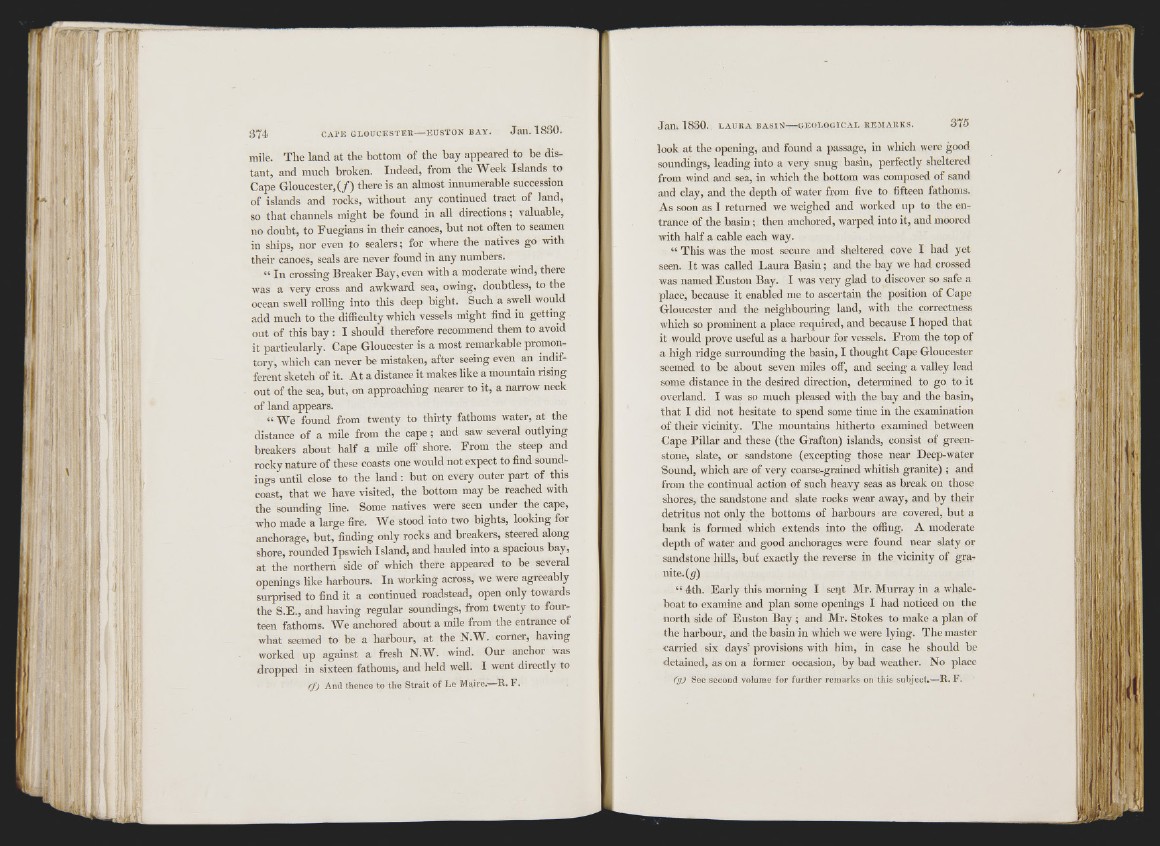
f' (' i'.;
I I
li '
mile. The land at the bottom of the bay appeared to be distant,
and much broken. Indeed, from the Week Islands to
Cape Gloucester,( / ) there is an almost innumerable succession
of islands and rocks, without any continued tract of land,
so that channels might be found in all directions; valuable,
no doubt, to Fuegians in their canoes, but not often to seamen
in ships, nor even to sealers; for where the natives go with
their canoes, seals are never found in any numbers.
“ In crossing Breaker Bay, even with a moderate wind, there
was a very cross and awkward sea, owing, doubtless, to the
ocean swell i-olling into this deep bight. Such a swell would
add much to the difficulty which vessels might find in getting
out of this bay ; I should therefore recommend them to avoid
it particularly. Cape Gloucester is a most remai-kable promontory,
which can never be mistaken, after seeing even an indifferent
sketch of it. At a distance it makes like a mountain rising
out of the sea, but, on approaching nearer to it, a narrow neck
of land appears.
“ We found from twenty to thirty fathoms water, at the
distance of a mile from the cape; and saw several outlying
breakers about half a mile off shore. From the steep and
rocky nature of these coasts one would not expect to find soundings
until close to the land; but on every outer part of this
coast, that we have visited, the bottom may be reached with
the sounding line. Some natives were seen under the cape,
who made a large fire. We stood into two bights, looking for
anchorage, but, finding only rocks and breakers, steered along
shore, rounded Ipswich Island, and hauled into a spacious bay,
at the northern side of which there appeared to be several
openings like harbours. In working across, we were agreeably
surprised to find it a continued roadstead, open only towards
the S.F., and having regular soundings, from twenty to fourteen
fathoms. We anchored about a mile from the entrance of
what seemed to be a harbour, at the N.W. corner, having
worked up against a fresh N.W. wind. Our anchor was
dropped in sixteen fathoms, and held well. I went directly to
t f j Anil thence to the S trait of Le Maire.—R. F .
look at the opening, and found a passage, in which were good
soundings, leading into a very snug basin, perfectly sheltered
from wind and sea, in which the bottom was composed of sand
and clay, and the depth of water from five to fifteen fathoms.
As soon as I returned we weighed and worked up to the entrance
of the basin ; then anchored, warped into it, and moored
with half a cable each way.
“ This was the most secure and sheltered cove I had yet
seen. It was called Laura Basin; and the bay we had crossed
was named Fustoii Bay. I was very glad to discover so safe a
place, because it enabled me to ascertain the position of Cape
Gloucester and the neighbouring land, with the correctness
which so prominent a place required, and because I hoped that
it would prove useful as a harbour for vessels. From the top of
a high ridge surrounding the basin, I thought Cape Gloucester
seemed to be about seven miles off, and seeing a valley lead
some distance in the desired direction, determined to go to it
overland. I was so much pleased with the bay and the basin,
that I did not hesitate to spend some time in the examination
of their vicinity. The mountains hitherto examined between
Cape Pillar and these (the Grafton) islands, consist of greenstone,
slate, or sandstone (excepting those near Deep-water
Sound, which are of very coarse-grained whitish granite) ; and
from the continual action of such heavy seas as break on those
shores, the sandstone and slate rocks wear away, and by their
detritus not only the bottoms of harbours are covered, but a
bank is formed which extends into the offing. A moderate
depth of water and good anchorages were found near slaty or
sandstone hills, but exactly the reverse in the vicinity of granite.
(^)
“ 4th. Early this morning I sent Mr. Murray in a whaleboat
to examine and plan some openings I had noticed on the
north side of Euston Bay ; and Mr. Stokes to make a plan of
the harbour, and the basin in which we were lying. The master
carried six days’ provisions with him, in case he should be
detained, as on a former occasion, by bad weather. No place
ig j Sec second volume for further remarks on this subject,—R* F